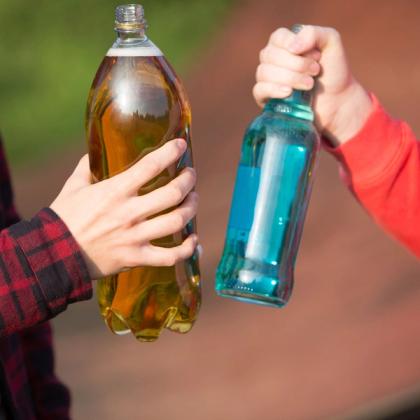In this episode, Dr Hannah Rosa reflects upon the changing relationship between young people and alcohol. She examines the latest statistics before discussing the Chief Medical Officer for England’s guideline on alcohol consumption for children and young people. The focus then moves on to the harms that we now know that alcohol can cause to young people, especially to the developing brain, before finishing with emphasising the role that professionals in primary care play in supporting these young people and their families.
Key take-home points
- In 2021, NHS Digital asked pupils aged between 11 and 15 about their alcohol consumption; 40% admitted to having drunk alcohol before, and 9% said that they had had an alcoholic drink in the last week – consuming an average of 8.9 units.
- In 2023, Drinkaware published a report entitled, “The Sober Myth: Are Young Adults Really a Generation of Non-Drinkers?” They surveyed young adults aged 18–24 from across the UK and found that more are choosing not to drink, with a rise from 14% in 2017 to 21% in 2023. However, they also found that those who do drink are more likely to binge drink and drink at high risk or dependent levels compared to drinkers aged 25 and over.
- In 2009, the first official guideline on alcohol aimed at children and young people from the Chief Medical Officer for England was published. In this, an alcohol-free childhood is advised as the healthiest and best option.
- Alcohol in childhood can bring many potential harms. It increases the risks of accidents, injuries and being a victim of an assault. Alcohol also increases the likelihood of being involved in other risk-taking behaviours, including smoking, taking illegal drugs and antisocial and criminal behaviour.
- Alcohol can also affect a young person’s physical, mental and sexual health as well as having a detrimental effect on their educational performance.
- Drinkaware commissioned a review of the impact of alcohol on brain development in adolescence. They found that, overall, young people who drink alcohol showed regional differences in brain structure compared with young people who do not drink alcohol.
- A report published in 2022 by NHS Digital found that the strongest factor associated with pupils having had an alcoholic drink within the last week was having parents who do not discourage drinking. When pupils were asked where they had obtained alcohol from in the last 4 weeks 75% of them said that they had been given it by parents.
- The Audit-C and Audit screening tools have been validated for use with adolescents to screen for harmful alcohol consumption. However, using these alone may not give the full picture as there may be other vulnerabilities present that will put a young person at a greater risk of harm.
- If you have any concerns about a young person who has drunk alcohol, specialist youth alcohol services will be more than happy to see them, regardless of their Audit score.
Useful resources
- Drinkaware. https://www.drinkaware.ie/wp-content/uploads/2023/04/Talking-Matters-2023.pdf.
- What’s the harm. https://whatstheharm.co.uk/.
Key references
- NHS England. 2022. https://digital.nhs.uk/data-and-information/publications/statistical/smoking-drinking-and-drug-use-among-young-people-in-england/2021/part-5-alcohol-drinking-prevalence-and-consumption.
- NHS England. 2015. https://digital.nhs.uk/data-and-information/publications/statistical/smoking-drinking-and-drug-use-among-young-people-in-england/2014.
- Whitaker V, et al. BMC Public Health. 2023;23:402. doi: 10.1186/s12889-022-14760-y.
- Drinkaware. 2022. https://www.drinkaware.co.uk/facts/information-about-alcohol/alcohol-and-the-law/the-law-on-alcohol-and-under-18s.
- Department of Health. 2009. https://assets.publishing.service.gov.uk/media/6266dd208fa8f523bf22abec/cmo-alcohol-guidance-17122009.pdf.
- Department for children, schools and families. 2009. https://dera.ioe.ac.uk/id/eprint/11355/1/DCSF-RR067.pdf.
- Alcohol Forum Ireland. https://alcoholforum.org/wp-content/uploads/2022/04/AlcoholForum_ParentsGuideBOOKLET.pdf.
- Drinkaware. 2023. https://www.drinkaware.co.uk/news/young-adults-are-more-likely-to-drink-at-high-risk-levels-despite-growth-in-non-drinkers.
- Alcohol Res Health. 2004-2005;28(3):125-131.
- Ewing SW, et al. Neuroimage Clin. 2014;5:420-437. doi: 10.1016/j.nicl.2014.06.011.
- Ellickson PL, et al. Pediatrics. 2003;111(5):949-955. doi: 10.1542/peds.111.5.949.
- Alcohol Think Again. https://alcoholthinkagain.com.au/alcohol-and-young-people/for-parents.
- Drinkaware. https://www.drinkaware.co.uk/advice-and-support/underage-drinking/talking-to-your-child-about-alcohol.
- Public Health England, NHS England and Health Education England. 2016. https://www.england.nhs.uk/wp-content/uploads/2016/04/making-every-contact-count.pdf.
- Liskola J, et al. Drug Alcohol Depend. 2021;218:108424. doi: 10.1016/j.drugalcdep.2020.108424.
- Newbury-Birch D, et al. http://therapeutic-solutions.org.uk/assets/static/proposals/YoungPeople_Factsheet.pdf.
- GOV.UK. 2024. https://www.gov.uk/government/statistics/substance-misuse-treatment-for-young-people-2022-to-2023/young-peoples-substance-misuse-treatment-statistics-2022-to-2023-report.
Create an account to add page annotations
Annotations allow you to add information to this page that would be handy to have on hand during a consultation. E.g. a website or number. This information will always show when you visit this page.
